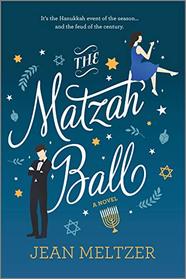Helpful Score: 1
Congratulations to Jean Meltzer for publishing her debut novel The Matzah Ball! This was an enjoyable step into the holiday reading season.
The premise: Rachel Rubenstein-Goldblatt, daughter of a highly regarded rabbi, loves Christmas. She's written many best-selling Christmas romance novels and her home office is decorated in red and green from ceiling to floor. The problem? Rachel is Jewish, very very Jewish. Jacob Greenberg created a successful entertainment corporation that plans lavish events (think Coachella). He's back in NYC to host Matzah Ball Max, the ultimate Hanukkah celebration, and wants Rabbi Goldblatt, Rachel's father, to be involved to give it credibility. Rachel and Jacob haven't seen each other since they were sweethearts at Jewish summer camp at age 12 when their brief 'romance' ended in hurt feelings for both. As they're brought together nearly 20 years later, will sparks- or insults - be flying?
This story has all the customary components of a romance: hero and heroine have long-held resentments over trivial issues, forced proximity renews attraction, something happens to create tension in the relationship, and then all is resolved for the HEA ending. What adds interest is the Jewish customs, terminology, and foods that permeate the plot and the fact that the heroine has an often misunderstood chronic illness that impacts every facet of her life.
I appreciated that the novel acknowledges that Hanukkah is a minor holiday in Jewish tradition. I was frustrated with the portrayal that Christmas is a wonderful, magical, secular holiday for every non-Jewish person and was glad when the characters admit that fantasy doesn't reflect reality for all. Because the author shares the heroine's chronic health condition of myalgic encephalomyelitis, I understand her strong emotions, but the frequent references to the condition's badly-worded name of chronic fatigue syndrome became repetitive and annoying. I enjoyed all of the secondary characters, especially Rachel's best friend Mickey and Jason's bubbe Toby.
Thank you to MIRA and NetGalley for the review copy; all thoughts are my own.
The premise: Rachel Rubenstein-Goldblatt, daughter of a highly regarded rabbi, loves Christmas. She's written many best-selling Christmas romance novels and her home office is decorated in red and green from ceiling to floor. The problem? Rachel is Jewish, very very Jewish. Jacob Greenberg created a successful entertainment corporation that plans lavish events (think Coachella). He's back in NYC to host Matzah Ball Max, the ultimate Hanukkah celebration, and wants Rabbi Goldblatt, Rachel's father, to be involved to give it credibility. Rachel and Jacob haven't seen each other since they were sweethearts at Jewish summer camp at age 12 when their brief 'romance' ended in hurt feelings for both. As they're brought together nearly 20 years later, will sparks- or insults - be flying?
This story has all the customary components of a romance: hero and heroine have long-held resentments over trivial issues, forced proximity renews attraction, something happens to create tension in the relationship, and then all is resolved for the HEA ending. What adds interest is the Jewish customs, terminology, and foods that permeate the plot and the fact that the heroine has an often misunderstood chronic illness that impacts every facet of her life.
I appreciated that the novel acknowledges that Hanukkah is a minor holiday in Jewish tradition. I was frustrated with the portrayal that Christmas is a wonderful, magical, secular holiday for every non-Jewish person and was glad when the characters admit that fantasy doesn't reflect reality for all. Because the author shares the heroine's chronic health condition of myalgic encephalomyelitis, I understand her strong emotions, but the frequent references to the condition's badly-worded name of chronic fatigue syndrome became repetitive and annoying. I enjoyed all of the secondary characters, especially Rachel's best friend Mickey and Jason's bubbe Toby.
Thank you to MIRA and NetGalley for the review copy; all thoughts are my own.
Helpful Score: 1
Rachel and Jacob met at summer camp. They went from enemies to friends to something more (as much as a 12 your old can anyway). Until Rachel thought Jacob did something which caused her to react. Her reaction let to his thinking she abandoned him. Even though they were 12, that summer left an impact (Jacob's parents were divorcing, his mom has MS, and he was moving to France). He was a little shit to him mom and he has regrets about his childhood behaviors. Rachel's dad is a Rabbi and she feels pressure to act a certain way because of that. She cares what people think.
Grownup Rachel is a romance writer. It's scandalous because she writes Christmas romances (under a pen name). She loves Christmas (the scandal!). She runs into a problem when her publisher wants her to write a Hanukkah romance. Enter Jacob and his Matzah Ball. Jacob has his own event planning company and rolls in the dough.
I thought this had a good balance with showing how someone has learned to live with chronic illness (Rachel has myalgic encephalomyelitis or as it's more commonly named- chronic fatigue syndrome). Also as someone who is not Jewish, the author did a good job of explaining Jewish customs/sayings without being preachy. I thought both characters are relatable and each have made their own assumptions they need to get over.
Grownup Rachel is a romance writer. It's scandalous because she writes Christmas romances (under a pen name). She loves Christmas (the scandal!). She runs into a problem when her publisher wants her to write a Hanukkah romance. Enter Jacob and his Matzah Ball. Jacob has his own event planning company and rolls in the dough.
I thought this had a good balance with showing how someone has learned to live with chronic illness (Rachel has myalgic encephalomyelitis or as it's more commonly named- chronic fatigue syndrome). Also as someone who is not Jewish, the author did a good job of explaining Jewish customs/sayings without being preachy. I thought both characters are relatable and each have made their own assumptions they need to get over.





